Personalized Product Recommendations for E-commerce: Detailed Guide [2025]
If you are wondering about personalized product recommendations in e-commerce, this complete guide is for you.
TL;DR
- Personalized product recommendations are tailored suggestions made to shoppers based on customer preferences, browsing history, and transactional data.
- The main benefits of personalized product recommendations are that they can increase conversion rates, improve the customer experience, and increase average order values (AOV) with up-selling and cross-selling.
- The types of personalized product recommendations are on-page recommendations (e.g., on the home page or product pages), recommendations when searching on the site, recommendations during a conversational experience, or recommendations via email.
What Are Product Recommendations in E-commerce?
Product recommendations are tailored suggestions made to shoppers that are based on their:
- Unique product preferences.
- Browsing history.
- Purchasing behavior.
These recommendations can be personalized with AI technology. The recommendation engines use machine learning (ML) to offer products that are most likely to appeal to each shopper.
This recommendation engine is real-time and personalized to each individual visitor, ensuring that your customers see the most up-to-date products based on their last interaction in your store.
Retailers are utilizing product recommendations to guide customers through their product discovery journey.
The product recommendation software utilizes algorithms, combined with predictive AI, to analyze user behavior even if your customers are not registered on your website.
After all, not every retailer is like Amazon, with access to millions of customer accounts of returning customers.
➡️ This is why modern AI product recommendation tools like Big Sur AI are designed to use interaction data to develop recommendations for anonymous users (more on that later).
💡Statistics show that personalized recommendations can make 28% of customers more likely to buy a product they didn’t intend to purchase initially.
What are the Benefits of Personalized Product Recommendations?
Here are the top 3 benefits of personalized product recommendations for online stores:
#1: Increase Conversion Rate with Personalized Recommendations
Technical experts like Alex Konduforov agree that one of the main advantages of personalized recommendation systems is that they lead to higher conversion rates.
This is because because you assist your customers in finding the perfect fit for their needs.

Esen utilizes Big Sur AI to bring a conversational experience to their store, coupled with on-page product recommendations, to increase their conversion rates.
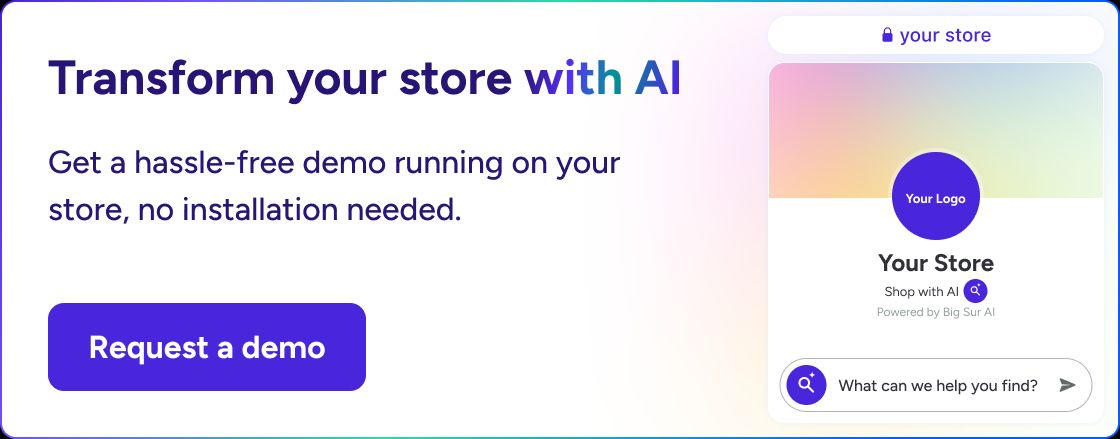
Your brand can use product recommendations to turn browsers into buyers.
Research shows that 49% of consumers have made impulse purchases after an e-commerce store recommends a product.
#2: Improved Customer Experience with Product Discovery
The beauty of product recommendations is that they improve the shopping experience by guiding customers to products that meet their needs.
This not only increases the chance of converting but also customer satisfaction.
Product recommendations can also be personalized to the specific attributes of your customers.
For example, your customers’ height might matter, such as when purchasing an e-bike.
This is why Rad Power Bikes utilized Big Sur AI’s Sales Agent, which is a conversational experience that recommends products after shoppers point out their preferences.
Here’s what happens if you ask the AI shopping assistant to recommend an e-bike for a height of 6’2 ⤵️:

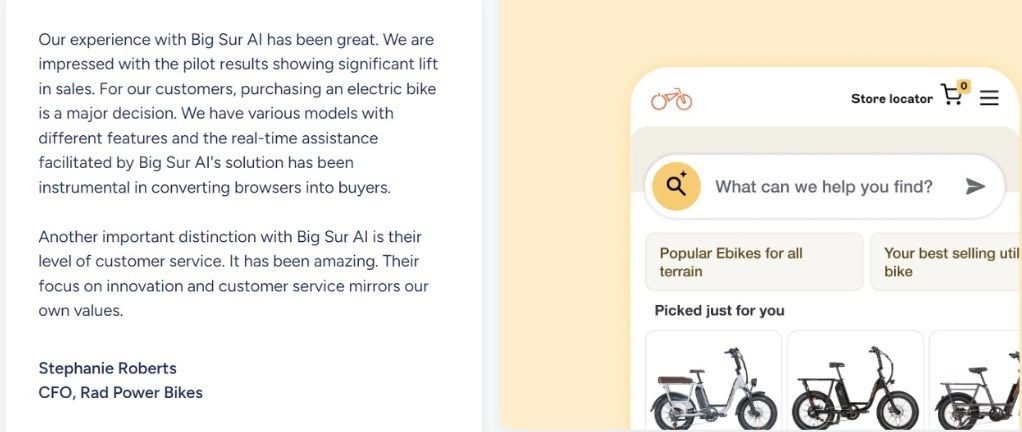
The AI Sales Agent is like having a dedicated shopping assistant at every stage of the customer shopping journey to help them make the right choice.
And customers appreciate such a personalized shopping experience.
If the recommendations and product discovery support are spot-on, their shopping experience is smooth and enjoyable, making your customers feel heard and understood.
#3: Cross-Selling & Up-Selling Opportunities Based on Customer Data
Product recommendations can increase your average order value (AOV) by cross-selling and up-selling products by identifying consumer patterns.
Research from Adamapp found that personalized recommendations and strategic cross-sells can increase the average order value (AOV) by 11%.
The way it works is that AI technology analyzes what products are frequently bought together and can cross-sell or up-sell products to shoppers, increasing basket sizes.
The recommendation engine detects when a customer has a product in their cart and suggests products that complement each other or have more features.
For example, Wyze uses Big Sur AI’s product recommendations to show items that are ‘’Picked for you’’ to up-sell their customers higher value cameras based on features.

What are the Types of Personalized Product Recommendations?
From a technical perspective, there are four types of personalized product recommendations:
- Product recommendations based on browsing history that consider the pages and products your shoppers viewed.
- Recommendations based on purchase history that take into account past purchases.
- Cross-selling and up-selling analyze what products the customer sees, has bought, or has in the cart.
- Real-time product recommendations based on website behavior and are refreshing as shoppers interact with your online store.
But from a customer perspective, these personalized recommendations can appear in the following places:
On-Page Product Recommendations
The most commonly used product recommendations are on-page product recommendations.
These include:
- Home page recommendations: Ideal for repeat shoppers when the recommendation engines have more information about them. Customers get product recommendations from the moment they enter the website.
- Product page recommendations: Customers are recommended complementary products or frequently bought-together items as they browse through product descriptions.
- Category page recommendations: By eliminating the need to know how to use filters, category page recommendations guide customers to relevant products for their needs.
- Cart page recommendations: Typically used for cross-selling or up-selling, retailers recommend related products to the item the shopper has in their cart.
For example, Amazon customizes its home page to each shopper with personalized recommendations.
And the more customer data they have about product preferences and past purchases, the more relevant they are.

Product Recommendations in Site Search
Product recommendations can appear when customers are using your site’s search functionality.
More and more merchants have been setting up AI-powered site searches in their stores that offer personalized product recommendations.
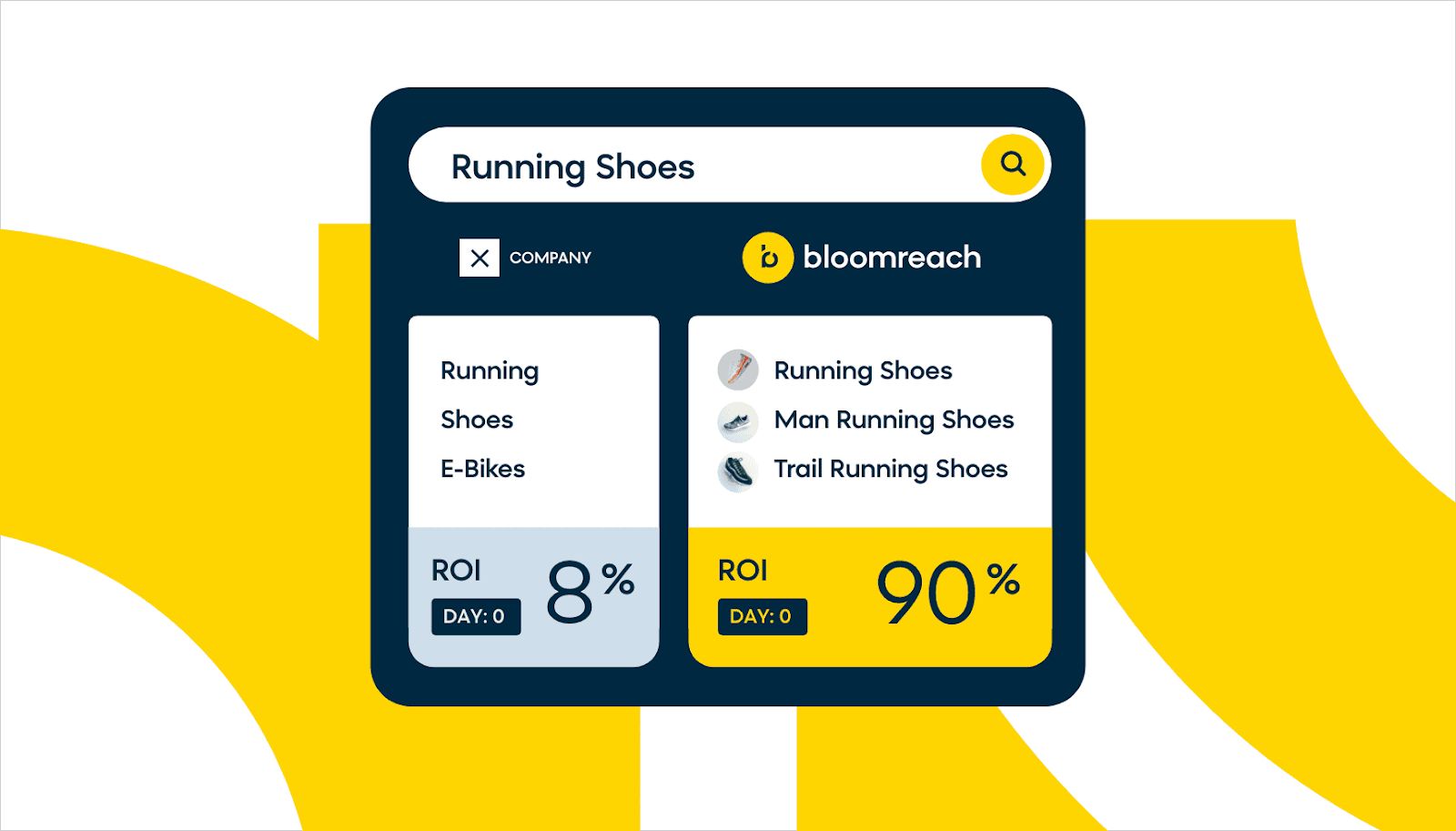
43% of users go directly to the search bar on an e-commerce site, which is why retailers have been investing in a great site search experience.
Returning to Amazon, the brand has set up a personalized site search that converts 12% of the search users.
Amazon utilizes advanced machine learning algorithms to analyze all available customer data for each consumer and personalize the site search results.

Image and data from NachoAnalytics.
Product Recommendations During a Conversational Experience
Shoppers can also receive product recommendations during a conversation with an AI assistant.
The conversational experience can be found when customers are browsing the website via a widget or as prompts.

These chat-based assistants provide 24/7 real-time support to prospective customers, similar to how an in-store assistant would.
Online brands are using Big Sur AI to assist their customers in their product discovery experience, helping them find the right product for their needs or compare multiple alternatives.
The software's advice has been optimized for conversions, providing relevant recommendations and proposing follow-up questions on a data-driven basis on what would most likely lead to a conversion.
Here’s an example of Rad Power Bikes using our AI Sales Agent to alleviate hesitations from customers when purchasing their specialized products ⤵️
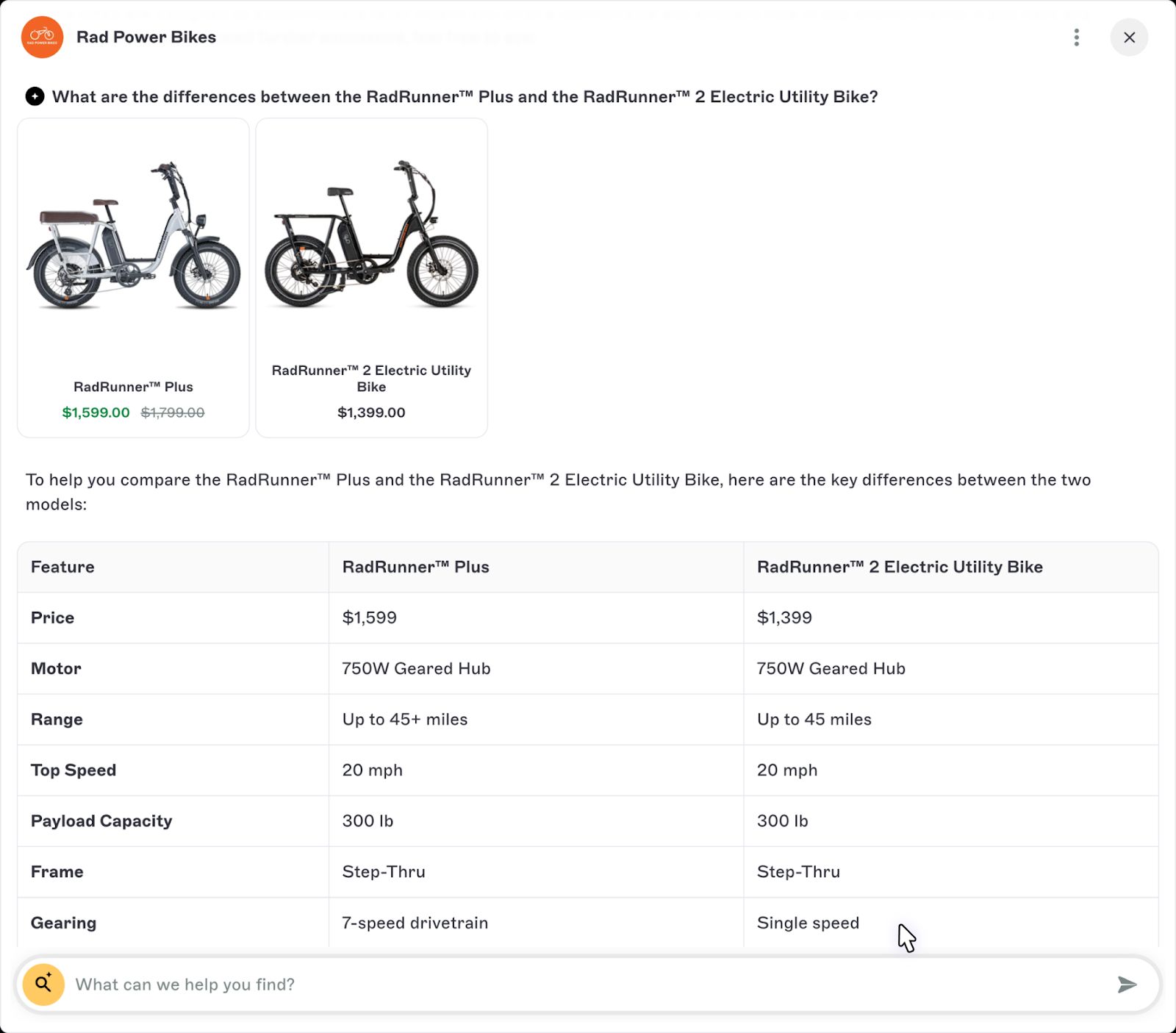
Non-Site Product Recommendations, Such As On Email
Your customers can receive product recommendations outside of your website, such as by email.
Online retailers can set up automated email campaigns that trigger personalized recommendations based on pre-defined business rules and user behavior.
One of the more popular use cases is setting up abandoned cart email flows with personalized product recommendations.
For example, Orlebar Brown incorporated product recommendations via shopping cart abandonment emails.

This email flow contributed to a 6.59% increase in sales volume.
The brand even added product recommendations to in-parcel marketing information that is sent with the items.
How to Use Personalized Product Recommendations To Increase Conversions?
If you want to improve your conversion rate with personalized product recommendations, then you need to set them up across different touchpoints.
This includes setting up product recommendations across the home page, product and category pages, cart, and email.
However, it’s also important to consider that different touchpoints carry different expectations, so retailers need to make appropriate recommendations at each step of the customer journey.
For example, it may not be optional to recommend "frequently bought together" products as your customers may not be aware of what the main product should be.
Or showcasing trending products on your category page when you have insufficient information about your customers.
This is why it’s important that the product recommendation engine works with first-party data to make relevant recommendations instead of generic ones.
The goal is to provide personalized, real-time recommendations at every point in the shopping buying journey.
There are different methods to enable personalized product recommendations, but here are the two most popular choices among e-commerce stores.
Collaborative Filtering
This recommendation system predicts a shopper's preferences based on the tastes of other shoppers.
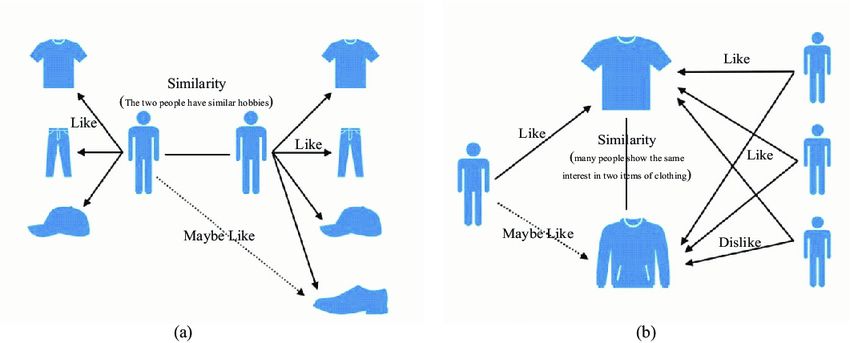
The recommendation engine operates on the premise that if a customer enjoys a certain product (e.g., a Nike hoodie) and another customer likes the same product but also a different one (e.g., Nike sneakers), then the third user might also appreciate the Nike sneakers.
Using collaborative filtering without enough customer data can lead to issues known as cold start problems, where shoppers receive sub-par recommendations that may not resonate with them.
Content-Based Filtering
This recommendation system centers on the products themselves, suggesting similar items based on specific attributes.
Content-based filtering does not require prior shopper interactions with products to generate product recommendations.
Insights can be drawn from textual data such as product descriptions and shopper ratings.
This method can address the cold start problem for new users by establishing connections between products and combining that with first-party data.

You can get started with personalized product recommendations by incorporating a tool like Big Sur AI on your e-commerce store.
The software makes contextual product recommendations based on the following:
- Your customers’ engagement with your store (e.g., product views & buttons clicked).
- Information that was gathered through the conversational experience with the AI Sales Agent.
- Questions that the customer asked our tool.
Big Sur AI's product recommendations are broken into three modules and are shown to customers according to the page they’re on and how they got there:
- Picked just for you: Displays a selection of products that a user is most likely to buy based on what the software knows about them.
- Frequently bought together: These recommendations appear once your shoppers add a product to their cart. This module features other products that customers typically buy based on their previous website activity.
- Top sellers: We show the bestsellers in the same product category as the product your customers are considering.
The tool shows products based on the shoppers' gathered information and not generic recommendations.
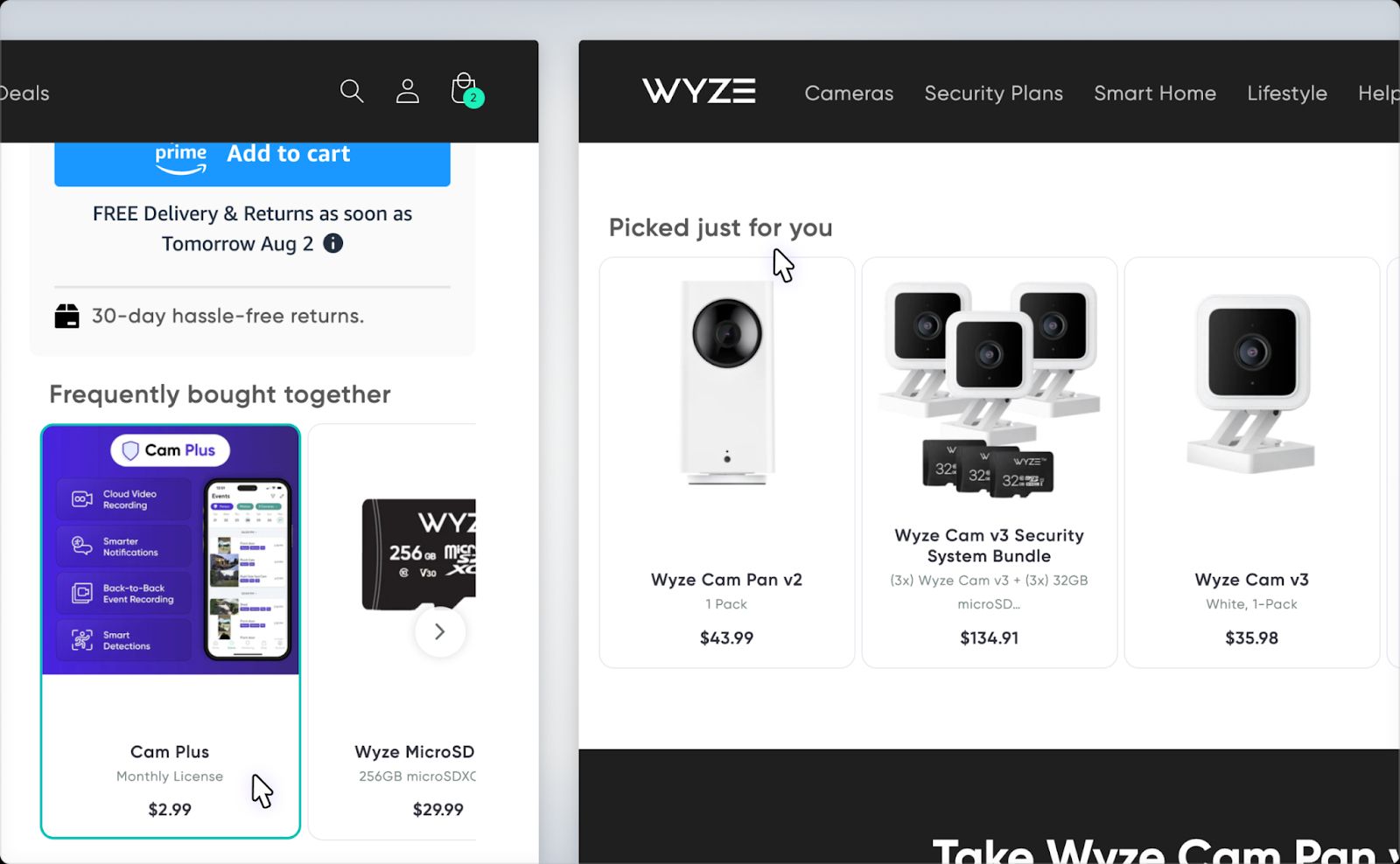
Your shoppers can receive these personalized product recommendations on your product pages, category pages, or during a conversation with the AI Sales Agent, dramatically increasing basket sizes.
The tool is compatible with all e-commerce CMS and can be integrated into Shopify in about 5 minutes.
Increase Your Conversions With Big Sur AI
Big Sur AI is an AI-powered shopping assistant that increases conversion rates and basket sizes by helping customers find the best product for their needs.
The tool achieves that via AI product recommendations and a human-like conversational experience.
Here’s the AI Sales Agent in action ⤵️:
Designed with conversions in mind, our AI Sales Agent has been optimized to provide relevant product recommendations based on shopper data and propose follow-up questions.
💡Customers who interact with Big Sur AI Sales Agent convert at four times the rate of the average store user.

The tool can understand user intent and recommend the right product for your customers' needs.
Big Sur AI also prompts your shoppers to start more conversations, leading to more purchases and increased basket sizes.
Our software analyzes how each consumer engages with your store, predicts which questions they will likely ask, and suggests them throughout their shopping experience.
Here’s an example from Wyze ⤵️

You'll also get insights into the conversion rates of each question your customers ask that leads to a conversion.
This will help your marketing team identify the crucial pre-purchase questions interested customers ask.
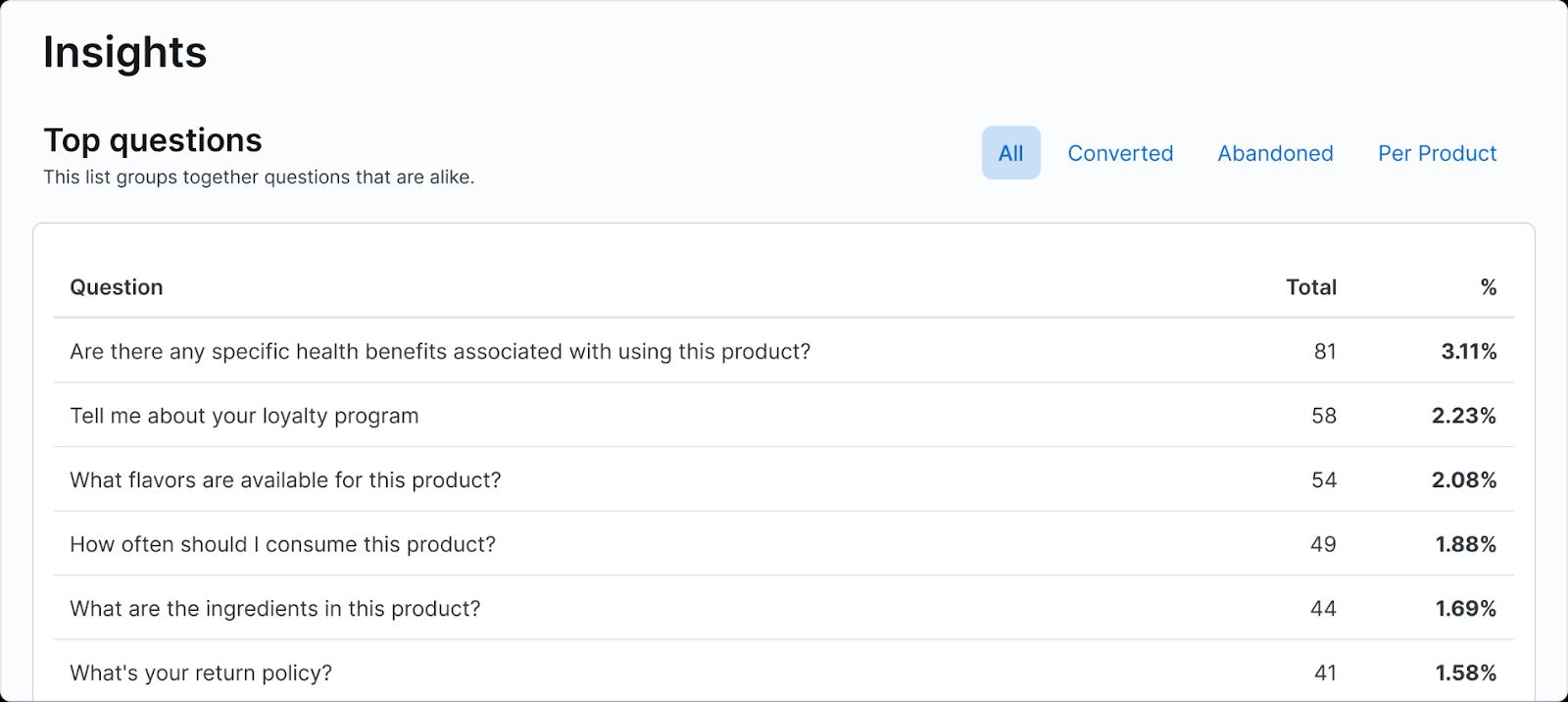
You also gain insights into what products are frequently bought together, which can help you improve your store’s shopping experience.

Optimize your online store with a conversational experience that works 24/7 to assist your customers and make AI product recommendations.
Our AI-powered Sales Agent can guide customers' shopping journey with personalized recommendations and conversion-optimized prompts.
The conversational experience helps your shoppers find the right product for their needs.
Be data-driven about what products are frequently bought together and what pre-purchase questions customers have on your website.


